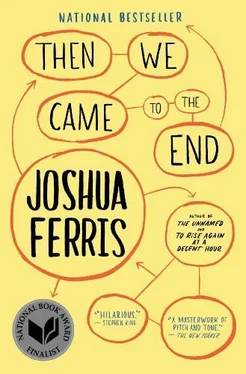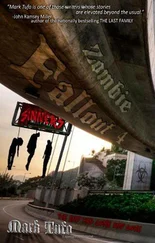We heard that time and again — “Never take no wooden nickels” — until we wanted to clobber him over the head with a mallet. Except for the surprise of his homeless-man’s car, and his half-hour conversation with the building guy on the day he was terminated, Old Brizz was fatiguing in his predictability. He came in, he proofread in a pair of nineteen-fifties eye frames, he left at ten-fifteen for the day’s first smoke break. Good god, we could still see him standing in the winter freeze outside the building in nothing but a ratty sweater vest, jowls like a hound dog’s, pulling on his pointy cigarette. He came back in smelling like fifty butts in an ashtray. He brought out his baloney sandwiches at quarter past noon and chased them down with a Thermos of black coffee that he made at home because he claimed the stuff down the hall was too gourmet for his taste.
One day not long after Brizz’s death, Benny started calling us into his office. Benny’s office had all the cool stuff in it. A gumball machine, remote-controlled cars. He put an anatomical skeleton against the wall just inside the doorway, so it stared back at him at his desk. Everyone asked where he got the skeleton. His answer was always “Some dead guy.” He duct-taped a Buck Rogers gun to the skeleton’s hand and crowned the smooth skull with a cowboy hat.
Benny was uploading a finished ad to the server when Jim walked by. “Jim, get in here. I got news for you.”
Jim came into Benny’s office and sat down.
“I’m uploading,” said Benny.
“That’s your news?”
“Brizz named me a beneficiary in his will. Blattner! Get in here, I got news for you.”
Blattner came in and sat down next to Jim across the desk from Benny.
“Listen to this,” said Benny. “Brizz named me a beneficiary in his will.”
“Get out,” said Blattner. “That’s funny because —”
“Marcia!”
Marcia walked past and then reappeared. She stepped inside the doorway and stood next to Buck, the space cowboy skeleton. “Brizz named Benny a beneficiary in his will,” said Jim, craning his neck so he could see Marcia. She came in and sat down on the barstool.
“That’s funny because it sounds just like this screenplay I’m working on,” said Blattner.
“Genevieve!” said Benny.
Genevieve stopped in the doorway.
“Genevieve,” said Blattner, “remember that screenplay I was telling you about? It happened to Benny in real life.”
“What screenplay?” asked Genevieve.
“Just listen,” said Benny. While his computer uploaded, he told us of receiving a letter from a lawyer on the South Side.
Genevieve had second thoughts. “I’m sorry, Benny, I can’t listen right now,” she said, rattling some revisions in her hand. “I have to get these down to Joe.” She abandoned the doorway.
Hank showed up. “What’s going on?” he asked, adjusting his big black eyeglasses.
“Brizz made Benny a beneficiary in his will,” said Marcia.
“And Blattner stole the idea for a screenplay,” said Jim.
“No,” said Blattner. “No, that’s not —”
“Wait until I tell you what he left me,” said Benny.
“Why should he leave you anything?” asked Karen Woo, who had walked in with Hank. “You benefited financially from his death.”
“Karen,” said Benny, for the thousandth time. “Those are the rules of Celebrity Death Watch. What was I supposed to do?”
Benny arrived at a storefront law office on Cicero Avenue for the reading of the will. Brizz’s brother was the only other person in attendance. Benny and Bizarro Brizz recognized each other from the funeral. After handshakes and offers of coffee, the lawyer took a seat behind his big cherrywood desk. “Frank’s will,” said the lawyer, lifting an envelope. He removed the letter and looked down through his bifocals. Then he looked up and explained that the benefactor had written a few preliminary words.
Life had been very good to him, the letter explained. He had been blessed with loving parents, and growing up he had had a wonderful companion in his younger brother, whom he had loved, even if they had drifted a little once they reached adulthood. He had loved his wife, who had given him a delightful seventeen years. The thing he loved about life the most, Brizz had written, was the day-to-day living of it — the Chicago Sun-Times arriving on his front porch in the morning, a hot cup of black coffee and a good cigarette, and being alone in his warm house in winter.
“Brizz was married?” said Marcia.
“Is that the meaning of life?” asked Hank. “Coffee, a newspaper, and a cigarette?”
“And a warm house in winter,” said Blattner. “A Warm House in Winter — god, that’s a good title. Benny, toss me that pen.”
“Just listen,” said Benny. “It gets even better.”
The lawyer began. “‘I, Francis Brizzolera, a resident of Chicago, Illinois, being of sound mind and memory. .’” The lawyer skipped down silently. “‘To my brother, Philip Brizzolera, I will and bequeath the following property: all my financial holdings present upon my death — including any stocks, bonds, mutual funds, savings and checking accounts, and all contents of my safety deposit box. I also leave to my brother Phil my car —’”
“Let me tell you,” Benny said to us, “how relieved I was to hear that Brizz hadn’t left me his car with all that crap in it.”
“‘— and my house,’” continued the lawyer, “‘along with all of its contents, except that which I bequeath to Benjamin Shassburger.’”
Benny’s computer made a noise indicating his uploading was complete. It was probably time for us to get back to work. We were six months into layoffs at that point, with no end in sight.
“‘To Benny Shassburger,’” said the lawyer, “‘I will and bequeath my totem pole.’”
Benny said he shifted forward in his chair. He leaned an ear into the lawyer. “I’m sorry,” he said. “His what?”
The lawyer looked down again through his bifocals at the will. “It says here totem pole,” he said.
In the backyard of Brizz’s house, a single-family dwelling on the South Side to which Phil had to get both keys and directions from the lawyer, stood an enormous totem pole, roughly twenty-five feet tall. The two men walked around it in silence. All manner of heads had been carved into it — eagles’ heads, scary heads, heads of hybrid creatures. Some heads had pointy ears, some had long snouts. It was intricately carved and painted myriad bright colors. It had been driven into the ground so firmly that when Benny gave it a push — it was his now, after all — he felt no give whatsoever. Benny told us that as a kid, he and his father had participated in the YMCA’s Indian Guides, which he described as the Jew’s alternative to the Boy Scouts. His name was Shooting Star; his father’s name was Shining Star. He was a very dedicated collector of all things Indian back then, including cheap, poorly carved totem poles, which, over time, lost their attraction. But the one he had just inherited, with its rich scarlet luster and deep browns, contained an authentic and magical power that left him in awe. Because of its size and complicated carvings, but also because it was standing in a backyard in an old Irish neighborhood among the telephone wires, the lawn chairs and bird feeders, even a trampoline in the yard across the way. Some little girl had bounced up and down, up and down as Brizz’s totem pole stood impervious and resolute. Men in white tank tops had gone back and forth, back and forth with their lawn mowers, while that mute and primitive object refused to vacate the corners of their eyes. It could be glimpsed between houses driving down the street. Boys probably stopped to stare at it from their bicycles. Neighbors had to pull their barking dogs away. And all the while, the man inside, warm at his kitchen table reading the newspaper with a cigarette burning in a nearby ashtray, was content to know that in the backyard he had staked into the ground the relic, the symbol, the manifestation of his — what?
Читать дальше












